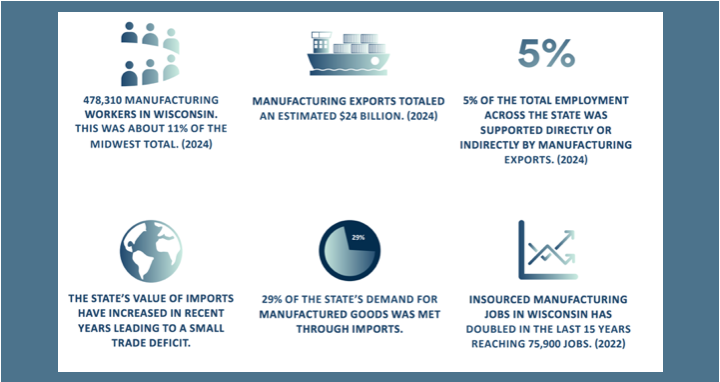June 26, 2025
MADISON — Wisconsin’s manufacturing sector continues to drive the state’s economy, contributing significantly to international trade and attracting growing foreign investment, according to a new report commissioned by Wisconsin Manufacturers & Commerce (WMC) in partnership with the Midwest Manufacturing Association.
The Wisconsin Manufacturing Trade and Foreign Investment Report, released this week, highlights the industry’s pivotal role, employing nearly 500,000 workers and generating $73.7 billion in GDP in 2024, making it the state’s largest economic sector. Manufacturers sold $209 billion in goods and produced $42.8 billion in earnings for workers.
Exports remain a cornerstone of Wisconsin’s manufacturing strength, with $24 billion in goods shipped globally in 2024. These exports directly supported 60,440 jobs—2% of the state’s workforce—while indirectly sustaining an additional 88,620 jobs, or 3% of employment.
“Wisconsin is a manufacturing state, so it is no surprise that manufacturers lead the way on exports,” said Kurt R. Bauer, WMC President and CEO. “Wisconsin’s economy depends on manufacturing, and a growing number of manufacturers depend on exports.”
Key export industries include agriculture and construction machinery ($1.76 billion), computer equipment ($1.74 billion), and navigational and control instruments ($1.63 billion). Canada is Wisconsin’s top trade partner, receiving $7.94 billion in exports, followed by Mexico ($4.36 billion) and China ($1.55 billion).
On the import side, Wisconsin’s demand for foreign goods outpaced exports, contributing to a modest trade deficit in 2024. Imports, which have risen steadily since 2009, met 29% of the state’s demand for manufactured goods. Leading imports included pharmaceuticals ($4.80 billion), general-purpose machinery ($2.86 billion), and navigational and control instruments ($1.68 billion). China led as the top import source ($6.42 billion), followed by Canada ($6.25 billion) and Mexico ($5.94 billion).
“Wisconsin has long played an important role in the national and global economy,” Bauer said. “We depend on internationally sourced raw materials and goods to then create components and products that we contribute elsewhere. It’s imperative we support this cycle through good policymaking, ensuring foreign and domestic markets are free, fair, and reciprocal.”
Foreign direct investment (FDI) also plays a growing role in Wisconsin’s manufacturing landscape. In 2022, foreign-owned companies employed 75,900 workers in the state’s manufacturing sector, double the number from 15 years earlier. The Midwest, including Wisconsin, outpaces the national average for insourced manufacturing jobs by nine percentage points, the report noted.
The findings underscore Wisconsin’s deepening integration into global markets, with manufacturing serving as a linchpin for economic growth and job creation.














